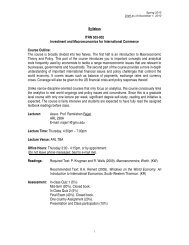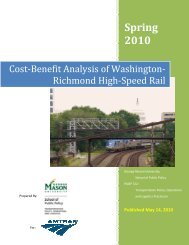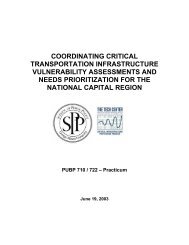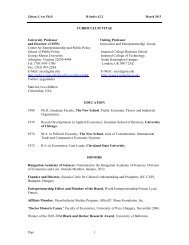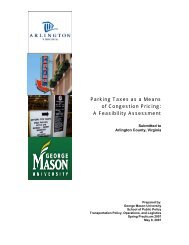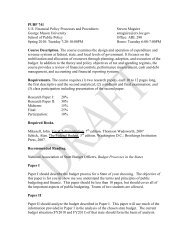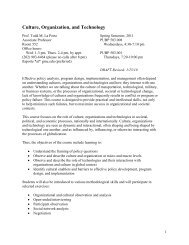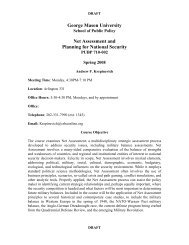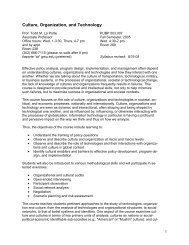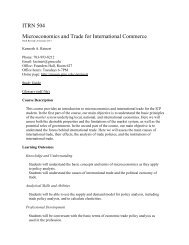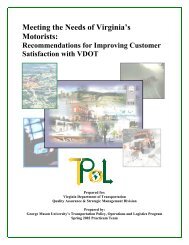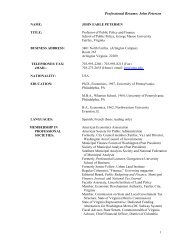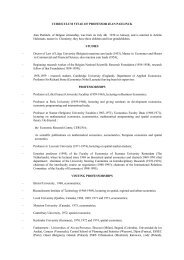PUBP 700-003 - George Mason School of Public Policy - George ...
PUBP 700-003 - George Mason School of Public Policy - George ...
PUBP 700-003 - George Mason School of Public Policy - George ...
You also want an ePaper? Increase the reach of your titles
YUMPU automatically turns print PDFs into web optimized ePapers that Google loves.
Theory and Practice in <strong>Public</strong> <strong>Policy</strong><br />
<strong>School</strong> <strong>of</strong> <strong>Public</strong> <strong>Policy</strong><br />
<strong>PUBP</strong><strong>700</strong>.005<br />
Fall, 2008<br />
Wednesdays, 7:20-10:00 p.m.<br />
Instructor: Jeremy D. Mayer, jmayer4@gmu.edu, 703-993-8223<br />
Office Hours: 4:00-6:00 p.m. Wednesdays Room #247. If you cannot make this time<br />
because <strong>of</strong> work or other obligations, we can certainly schedule an appointment. My<br />
email is the best way to reach me.<br />
Course Objectives<br />
Theory and Practice in <strong>Public</strong> <strong>Policy</strong>, the gateway course for the Master’s Program in<br />
<strong>Public</strong> <strong>Policy</strong>, introduces you to tools and concepts that will help you navigate in the world <strong>of</strong><br />
public policy in two ways. First, we explore several types <strong>of</strong> theories and assess their strengths,<br />
weaknesses and applicability to public policy in order to understand different varieties <strong>of</strong> theory,<br />
their uses and application. Second, you will be introduced to several perspectives on the practice<br />
<strong>of</strong> policy analysis and be given an opportunity to engage in an analytical policy project that<br />
allows you to practice working in a team. Strong ethical and international components are built<br />
into the course.<br />
The objective <strong>of</strong> this course is to help you become a more sophisticated policy<br />
pr<strong>of</strong>essional with an ability to operate effectively and ethically in a political environment. While<br />
many <strong>of</strong> the applications will be U.S.-based, the theories apply more broadly to policymaking<br />
elsewhere. You will be presented with a variety <strong>of</strong> ways <strong>of</strong> looking at political phenomena,<br />
conceiving <strong>of</strong> relationships, and understanding outcomes. The course seeks to heighten your<br />
sensitivity to economic and political context and your appreciation <strong>of</strong> theoretical rigor,<br />
disinterested analysis, and empirical evidence for assertions.<br />
You will hone your skills in recognizing values, seeing multiple sides <strong>of</strong> issues, casting<br />
alternative frames to problems, understanding underlying interests, identifying stakeholders, and<br />
devising strategies for action. Finally, the course aims to enhance your pr<strong>of</strong>iciency in<br />
identifying and using appropriate, authoritative source material and in writing and speaking<br />
articulately, succinctly, logically, and convincingly. Upon completion <strong>of</strong> this course, you should<br />
be well underway toward becoming a policy analyst and well prepared for the remainder <strong>of</strong> the<br />
MPP program.<br />
Specific Skills<br />
You will be taught and will practice the following skills in this class:<br />
1. How to find, assess and use sources appropriately and with greatest effect.<br />
2. How to develop criteria against which to assess policy options.<br />
3. How to apply basic policy tools to policy problems.<br />
4. How to work in a team effectively, to use the talents <strong>of</strong> all team members, and to generate<br />
maximum participation from each team member.<br />
5. How to identify, avoid, and otherwise handle conflicts-<strong>of</strong>-interest in your pr<strong>of</strong>essional<br />
life.
6. How to apply ethical precepts, beyond those <strong>of</strong> conflicts-<strong>of</strong>-interest, to public policy and<br />
to your pr<strong>of</strong>essional life.<br />
7. How to speak before a group forcefully and convincingly.<br />
8. How to use theory in practice.<br />
9. How to write and present a pr<strong>of</strong>essional policy analysis.<br />
10. How to create a strategy to achieve adoption and implementation <strong>of</strong> a recommended<br />
course <strong>of</strong> action.<br />
Assessment<br />
You will be asked to work individually and in teams in order to demonstrate your facility<br />
with the theories and their appropriate use, as well as to hone your research, public presentation<br />
and writing skills. Papers and examinations are treated as pedagogical exercises to augment your<br />
learning in the course. Grades will be apportioned in the following manner:<br />
* One 4-5 page Analytical Paper 20% <strong>of</strong> grade<br />
* Midterm exam 20%<br />
* Class participation, attendance and (possibly) pop quizzes 10%<br />
* Group policy analysis project 25%<br />
* Final exam (covers entire semester) 25%<br />
If you are working a schedule that requires you to miss more than 3 classes, you should consider<br />
taking this course in a different semester. Class participation is an important part <strong>of</strong> your grade;<br />
participation does not mean talking a lot. It means preparing carefully by completing the<br />
assigned reading before each day’s class. Good participation can mean one deft comment that<br />
moves the discussion forward.<br />
Arlington Campus Library <strong>Public</strong> <strong>Policy</strong> Liaison<br />
The GMU Arlington Campus Library is teaming up with SPP to provide special instruction to<br />
students in <strong>PUBP</strong><strong>700</strong>. The <strong>Public</strong> <strong>Policy</strong> Liaison <strong>of</strong> the Arlington Campus Library has helped us<br />
develop a curriculum to teach students about the enormous range <strong>of</strong> materials available to our<br />
students. You will learn how to access, cite and appropriately use library sources and will be<br />
given practice exercises to ensure that you can find exactly what you need when you need it.<br />
University Honor Code<br />
No cheating, plagiarizing, or other unpr<strong>of</strong>essional conduct will be tolerated. (Please see SPP<br />
statement below.) These are defined in the University Catalog as follows:<br />
A. Cheating encompasses the following:<br />
1. The willful giving or receiving <strong>of</strong> an unauthorized, unfair, dishonest, or unscrupulous<br />
advantage in academic work over other students<br />
2. The above may be accomplished by any means whatsoever, including but not limited to the<br />
following: fraud; duress; deception; theft; trick; talking; signs; gestures; copying from another<br />
student; and the unauthorized use <strong>of</strong> study aids, memoranda, books, data, or other information<br />
3. Attempted cheating<br />
2
B. Plagiarism encompasses the following:<br />
1. Presenting as one's own the words, the work, or the opinions <strong>of</strong> someone else without<br />
proper acknowledgment<br />
2. Borrowing the sequence <strong>of</strong> ideas, the arrangement <strong>of</strong> material, or the pattern <strong>of</strong> thought <strong>of</strong><br />
someone else without proper acknowledgment<br />
C. Lying encompasses the following: The willful and knowledgeable telling <strong>of</strong> an untruth, as<br />
well as any form <strong>of</strong> deceit, attempted deceit, or fraud in an oral or written statement relating to<br />
academic work. This includes but is not limited to the following:<br />
1. Lying to administration and faculty members<br />
2. Falsifying any university document by mutilation, addition, or deletion…<br />
SPP <strong>Policy</strong> on Plagiarism: One Instance <strong>of</strong> Cheating and You Are Expelled<br />
The pr<strong>of</strong>ession <strong>of</strong> scholarship and the intellectual life <strong>of</strong> a university as well as the field<br />
<strong>of</strong> public policy inquiry depend fundamentally on a foundation <strong>of</strong> trust. Thus any act <strong>of</strong><br />
plagiarism strikes at the heart <strong>of</strong> the meaning <strong>of</strong> the university and the purpose <strong>of</strong> the<br />
<strong>School</strong> <strong>of</strong> <strong>Public</strong> <strong>Policy</strong>. It constitutes a serious breach <strong>of</strong> pr<strong>of</strong>essional ethics and it is<br />
unacceptable.<br />
Plagiarism is the use <strong>of</strong> another’s words or ideas presented as one’s own. It includes,<br />
among other things, the use <strong>of</strong> specific words, ideas, or frameworks that are the product<br />
<strong>of</strong> another’s work. Honesty and thoroughness in citing sources is essential to<br />
pr<strong>of</strong>essional accountability and personal responsibility. Appropriate citation is necessary<br />
so that arguments, evidence, and claims can be critically examined.<br />
Plagiarism is wrong because <strong>of</strong> the injustice it does to the person whose ideas are stolen.<br />
But it is also wrong because it constitutes lying to one’s pr<strong>of</strong>essional colleagues. From a<br />
prudential perspective, it is shortsighted and self-defeating, and it can ruin a pr<strong>of</strong>essional<br />
career.<br />
The faculty <strong>of</strong> the <strong>School</strong> <strong>of</strong> <strong>Public</strong> <strong>Policy</strong> takes plagiarism seriously and has adopted a<br />
zero tolerance policy. Any plagiarized assignment will receive an automatic grade <strong>of</strong><br />
“F.” This may lead to failure for the course, resulting in dismissal from the University.<br />
This dismissal will be noted on the student’s transcript. For foreign students who are on<br />
a university-sponsored visa (e.g. F-1, J-1 or J-2), dismissal also results in the revocation<br />
<strong>of</strong> their visa.<br />
To help enforce the SPP policy on plagiarism, all written work submitted in partial<br />
fulfillment <strong>of</strong> course or degree requirements must be available in electronic form so that<br />
it can be compared with electronic databases, as well as submitted to commercial services<br />
to which the <strong>School</strong> subscribes. Faculty may at any time submit student’s work without<br />
prior permission from the student. Individual instructors may require that written work be<br />
submitted in electronic as well as printed form. The SPP policy on plagiarism is<br />
3
supplementary to the <strong>George</strong> <strong>Mason</strong> University Honor Code; it is not intended to replace<br />
it or substitute for it. (http://www.gmu.edu/facstaff/handbook/aD.html)<br />
Academic Accommodation for a Disability<br />
If you are a student with a disability and you need academic accommodations, please<br />
email and then make an appointment to see Dr. Mayer, and contact the Disability<br />
Resource Center (DRC) at 703-993-2474. All academic accommodations must be<br />
arranged through the DRC.<br />
Required Texts and Readings<br />
Eugene Bardach, A Practical Guide for <strong>Policy</strong> Analysis: The Eightfold Path to More Effective<br />
Problem Solving (Chatham House Publishers, 2000).<br />
CapWIN [Capital Wireless Integrated Network] Cap WIN Governance Options. (Can be found<br />
on course website)<br />
A. Lee Fritschler and Catherine E. Rudder. Smoking and Politics: Bureaucracy Centered<br />
<strong>Policy</strong>making, 6 th ed. (Upper Saddle River, NJ: Prentice Hall, 2007).<br />
NOTE: It is very important that you purchase the 6 th edition as it is substantially different than<br />
the previous editions.<br />
Diana Hacker, A Pocket Manual <strong>of</strong> Style, (4th) ed. or later (Bedford/St. Martin's, 2000 or<br />
later).<br />
Albert O. Hirschman, Exit, Voice and Loyalty: Responses to Decline in Firms,<br />
Organizations, and States (Harvard University Press, 1970).<br />
Margaret E. Keck and Kathryn Sikkink, Activists Beyond Borders: Advocacy Networks in<br />
International Politics (Cornell University Press, 1998).<br />
Charles E. Lindblom, The Market System: What It Is, How It Works, and What to Make<br />
<strong>of</strong> It (Yale University Press, 2001).<br />
Mancur Olson, The Logic <strong>of</strong> Collective Action (Any edition)<br />
Deborah Stone, <strong>Policy</strong> Paradox: The Art <strong>of</strong> Political Decision Making, Revised Edition<br />
(W. W. Norton, 2002).<br />
The Washington Post (daily: all U.S. and international news)<br />
Class Schedule, Topics, and Assignments<br />
4
The Fundamentals <strong>of</strong> <strong>Policy</strong> Analysis<br />
Class 1. August 27<br />
Lecture Topics<br />
• Introduction: Distribution <strong>of</strong> the syllabus and class assignments:<br />
• Conceptual Overview <strong>of</strong> the Course<br />
• Bardach: The Practice <strong>of</strong> <strong>Policy</strong> Analysis (Part 1)<br />
• Possible policy analysis project topics<br />
Class 2. September 3<br />
Assignments Due Today<br />
1. Read A Practical Guide for <strong>Policy</strong> Analysis , including appendices<br />
(Bardach) and the Capwin study, distributed via email.<br />
2. Read the front section <strong>of</strong> Hacker.<br />
3. Review the websites at the end <strong>of</strong> this syllabus or on our WebCT site.<br />
4. Be ready to answer the class questions below.<br />
5. Go to the GMU Library website and become familiar with the library<br />
resources. They are extensive.<br />
Lecture Topics: The Practice <strong>of</strong> <strong>Public</strong> <strong>Policy</strong><br />
Bardach’s main arguments<br />
Successful Research in <strong>Policy</strong> Analysis: The Complete Pr<strong>of</strong>essional<br />
What does it mean to be a pr<strong>of</strong>essional?<br />
What a policy pr<strong>of</strong>essional does<br />
Successful Teamwork<br />
Class questions for study and discussion:<br />
1. Why does Bardach suggest that the analyst must revisit the early steps <strong>of</strong> the<br />
analysis, especially the definition <strong>of</strong> the problem, many times?<br />
2. Which step does Bardach say is the most difficult? Why?<br />
3. What alternative must you always consider?<br />
4. What does Bardach say about the evaluative criteria? What are some <strong>of</strong> the<br />
evaluative criteria that you personally might choose to focus on?<br />
5. What do you consider to be the most important advice that Bardach gives?<br />
6. Can you think <strong>of</strong> any real life policy situations in which it might not be<br />
feasible to go through all eight steps? If so, give an example. If not, why not?<br />
5
7. In Capwin, examine how the different political arenas affected the outcome.<br />
8. Based on Capwin, consider how federalism in America shapes public policy.<br />
Note: You will be provided with an article in class to use for next week’s<br />
assignment. If you are not able to attend class this week, you are responsible for<br />
obtaining a copy <strong>of</strong> this article from one <strong>of</strong> your colleagues.<br />
Class 3. September 10<br />
READINGS: ONLINE<br />
Lecture Topics:<br />
Normative Theory as a Guide to Ethical Behavior<br />
Acting Ethically<br />
Ethical Conduct: A Guide to a Pr<strong>of</strong>essional Life Worth Living<br />
Class 4. September 17<br />
Assignments Due Today<br />
1. Read Activists Beyond Borders.<br />
2. Teams turn in the name <strong>of</strong> their proposed client and the definition <strong>of</strong> their<br />
problem for their policy analysis project.<br />
3. Be prepared to answer the class questions below.<br />
Lecture Topics: Groups in Concert: International <strong>Policy</strong> Networks<br />
Keck and Sikkink: Causal Relations and Causal Dynamics<br />
Class questions for study and discussion:<br />
1. What is Keck and Sikkink’s theory?<br />
2. What is new about Keck and Sikkink’s transnational advocacy networks?<br />
Haven’t such formations been in existence since the 19 th century?<br />
3. In what ways do Keck and Sikkink use social movement theory?<br />
4. Of what are TANs composed? How are TANs organized? Where is power<br />
located within TANs? How do you know?<br />
5. What is the boomerang technique? Is it exclusively applicable to international<br />
activities?<br />
6. What does it mean to frame an issue? What is the importance <strong>of</strong> this concept?<br />
6
7. Why does the development <strong>of</strong> advocacy networks and global public policy<br />
networks bring state sovereignty into question? Is this a significant matter?<br />
8. What advice would you give someone who wants to change a public policy<br />
but who has no particular political connections and is not wealthy?<br />
9. What is the distinction between normative and empirical theory? Why make<br />
this distinction?<br />
10. What techniques in Keck and Sikkink are used to influence public policy?<br />
11. Are these techniques applicable in domestic politics? Explain.<br />
Check out these human rights websites<br />
Human Rights Online: http://oz.uc.edu/thro/Educ-Guide.html<br />
Interview: http://globetrotter.berkeley.edu/people/Stover/stover-con99-0.html<br />
Example Projects from Ford Foundation:<br />
http://www.fordfound.org/publications/recent_articles/close_to_home.cfm<br />
Class 5. September 24<br />
Assignments Due Today<br />
Lecture Topics: Theory and Model & Making an Effective Argument<br />
Class Questions for Discussion:<br />
• What is a premise? What is an assumption?<br />
• What is an inductive argument and how does it differ from a deductive argument?<br />
Give examples <strong>of</strong> each.<br />
• Find an article in today’s paper and identify the premise and the assumptions.<br />
• To what degree is a policy analysis descriptive and to what degree is it<br />
prescriptive?<br />
• What is the role <strong>of</strong> evidence in a policy analysis? What is the role <strong>of</strong> values in a<br />
policy analysis? How are the two reconciled?<br />
• Where do policy options come from?<br />
• How does the analyst decide which policy options are viable?<br />
• How does the analyst go about developing criteria against which to assess policy<br />
options?<br />
• Why does Bardach emphasize that applying the criteria to the options is a matter<br />
<strong>of</strong> focusing on outcomes, not intentions? Why is this difficult?<br />
• Why are unintended consequences a problem for policy analysts and policy<br />
makers? Why do they occur? What can be done to minimize them?<br />
• You want to cite a web site that you have used. What is the appropriate format?<br />
• You have been asked to use a consistent citation style in your papers. How do<br />
you find and use an appropriate citation scheme?<br />
7
• In your opinion, what are the five best electronic sources for public policy<br />
research? Provide their web addresses. Indicate the criteria you used to make this<br />
selection and the way you applied the criteria to each <strong>of</strong> your choices.<br />
Class 6. October 1<br />
4-5 page Analytical Paper topic will be distributed in class – DUE NEXT<br />
WEEK<br />
Assignments Due Today<br />
1. Read all <strong>of</strong> The Market System. Please read this book carefully and<br />
completely. Like Blackburn, Lindblom makes very complex ideas<br />
understandable to the layperson. This is an extraordinary skill and one<br />
that good analysts need to develop. Try to see how Blackburn and<br />
Lindblom accomplish this feat.<br />
Lecture Topic: Economics: Understanding the Market Context<br />
Class questions for study and discussion :<br />
1. “[I]n our time the market system has become a global coordinator <strong>of</strong><br />
cooperative performances <strong>of</strong> at least 2 billion people.” Explain.<br />
2. How does Lindblom’s view <strong>of</strong> entrepreneurs relate to corporate scandals <strong>of</strong><br />
2002? In your answer, define “entrepreneur.”<br />
3. Between 1997 and 2001, U.S. companies spent $90 billion to lay 39 million<br />
miles <strong>of</strong> fiber optic cable - enough to circle the earth 1,566 times. Only<br />
2.6% <strong>of</strong> that is currently in use. How might a capitalist explain this result in<br />
light <strong>of</strong> the putative efficiency <strong>of</strong> the market?<br />
4. At base, how do markets work, according to Lindblom? Why does<br />
Lindblom consider the market system to be such a marvelous achievement?<br />
5. What are some alternatives to markets?<br />
6. Is a market system necessary for democracy?<br />
7. Does a market system inflict harm on democracy? So what?<br />
8. What does Lindblom mean when he repeatedly says that the market system<br />
pertains to society, not merely the economy?<br />
9. What is a spillover and what is its importance for markets and governments?<br />
10. What is the role <strong>of</strong> efficiency in markets and governments?<br />
11. You want to encourage saving (using mechanisms like IRA’s, for example).<br />
What factors would you want to take into account in devising a sharp,<br />
efficient policy proposal?<br />
12. What is the difference between a concept and its operationalization or<br />
measurement? Why is this distinction important?<br />
13. What is systematically collected, empirical evidence? What is its<br />
importance in public policy analysis?<br />
8
14. Lindblom argues that markets could theoretically exist in a non-democratic<br />
political system. Place this comment in the context <strong>of</strong> Lindblom’s text.<br />
15. You have been asked to determine the degree to which the former<br />
Communist countries in the Eastern Bloc are governed democratically.<br />
How would you go about performing this task? Be sure to reference<br />
Lindblom’s discussion <strong>of</strong> the relationship between democracy and markets,<br />
as one but only one element <strong>of</strong> your response.<br />
Class 7. October 8<br />
Assignments Due Today<br />
1. 4-5 page Analytical Paper is due.<br />
2. Read The Logic <strong>of</strong> Collective Action, pp. 1-97.<br />
Lecture Topics: Individuals in Concert:<br />
The Logic <strong>of</strong> Collective Action<br />
A classic<br />
An example <strong>of</strong> empirical, deductive theory<br />
The Role <strong>of</strong> Scientific Theory in <strong>Policy</strong> Analysis<br />
Class Questions for study and discussion:<br />
1. You are a consumer -- and until business spending picks up, the economy is<br />
depending on you. Are you up to the job? Explain.<br />
2. What is rational actor theory?<br />
3. What is the theory <strong>of</strong> collective action?<br />
4. What is a free rider? What is the significance <strong>of</strong> this concept to the policy<br />
analyst?<br />
5. What difference does the size <strong>of</strong> a group make in predicting the likelihood <strong>of</strong><br />
collective action?<br />
6. What is a latent group? Why is this concept important to Olson?<br />
7. What is the importance <strong>of</strong> a closed shop to a labor union?<br />
8. What is the difference between a latent group and an organized group?<br />
9. What are the limits <strong>of</strong> rational actor theory?<br />
10. <strong>Public</strong> or rational choice theory applied to economic activity seems to produce<br />
far more felicitous results than when applied to the social or political realm.<br />
Explain.<br />
12. In what ways do Olson’s and Keck and Sikkink’s theories differ? Compare<br />
their usefulness.<br />
Class 8. October 15<br />
9
Assignments Due Today<br />
1. Project Team leaders should turn in a tentative bibliography indicating<br />
sources that will be used for the policy analysis, a more fully developed<br />
description <strong>of</strong> the problem your team will be addressing in its policy<br />
analysis, and the names <strong>of</strong> your team members.<br />
2. Take-home mid-term distributed at the end <strong>of</strong> class. DUE NEXT WEEK<br />
3. Read Exit, Voice, and Loyalty, pp. 1-61, 76-105, and 120-126.<br />
Lecture Topics: Structuring Choice<br />
Exit, Voice and Loyalty: Hirschman’s Main Ideas<br />
The Loyalties <strong>of</strong> the <strong>Policy</strong> Analyst: The problem <strong>of</strong> bias<br />
Class questions for study and discussion:<br />
1. What does a reading <strong>of</strong> Hirschman suggest to you about the efficacy <strong>of</strong><br />
privatization? Is he correct? Explain. Be sure to define “privatization.”<br />
2. How does loyalty influence the use <strong>of</strong> exit or voice? Provide examples.<br />
3. Under what circumstances is voice most effective?<br />
4. Under what circumstances should a policy pr<strong>of</strong>essional quit a job?<br />
5. Would Hirschman endorse the practice <strong>of</strong> whistle blowing?<br />
6. Is it possible to retain personal integrity while working in institutions driven by<br />
political, economic and other values that may conflict with pr<strong>of</strong>essional standards?<br />
Explain.<br />
7. What's the value <strong>of</strong> a Consumer Product Safety Commission?<br />
8. Why have a Securities and Exchange Commission?<br />
9. Should democracies have freedom <strong>of</strong> information acts?<br />
10. Why might agencies tend to err on the side <strong>of</strong> secrecy when classifying information?<br />
11. Why do people who believe in limited government worry about the use <strong>of</strong> Orwellian<br />
language? (What is Orwellian language?)<br />
12. What difference does accurate auditing <strong>of</strong> public corporations make?<br />
Class 9. October 22<br />
Assignments Due Today<br />
MID-TERM EXAM DUE.<br />
Lecture Topics:<br />
Implications <strong>of</strong> Federalist # 10 and Constitution<br />
10
Preview <strong>of</strong> Smoking and Politics<br />
• How does the policymaking role <strong>of</strong> bureaucrats square with Article I, Section<br />
1 <strong>of</strong> the U.S. Constitution granting the legislative power to Congress?<br />
• Discuss the concept <strong>of</strong> policy agenda in light <strong>of</strong> the cigarette labeling<br />
controversy.<br />
• What are some <strong>of</strong> the reasons that are given for the growing importance <strong>of</strong><br />
agencies and bureaucracies?<br />
• <strong>Public</strong> policy-making by private entities<br />
Class 10. October 29<br />
Assignments due today<br />
1. Read <strong>Policy</strong> Paradox.<br />
2. Read Numbers as Political Tools: Facts Do Not Speak for Themselves in<br />
WebCT.<br />
Lecture Topic: The Political Project<br />
Class questions for study and discussion<br />
1. “It is important to represent both sides <strong>of</strong> the issue.” What is defective about this<br />
characterization?<br />
2. In what ways does the theory <strong>of</strong> collective action fail as a theory <strong>of</strong> political<br />
mobilization?<br />
3. Which is prior: policy issues or political contests? Explain.<br />
4. How does language affect policy problems?<br />
5. What might be an example <strong>of</strong> a conflict <strong>of</strong> interest that a policy analyst might confront?<br />
What are some other examples <strong>of</strong> conflict?<br />
6. What is just, according to Stone?<br />
7. What is the difference between justice as a concept and its operationalization or<br />
measurement?<br />
8. What does it mean to say that conceptual boundaries are contested? Provide an<br />
example from Stone.<br />
9. What does Stone mean when she says, “The definition <strong>of</strong> security, like other policy<br />
goals, is an exercise in political claims-making”?<br />
10. What does it mean to say that problem definition is “the strategic representation <strong>of</strong><br />
situations”?<br />
11. Explain the idea that no fact speaks for itself. What are the hidden stories in numbers?<br />
12. What are the implications behind the following assertion: “Problems, then, are not<br />
given, out there in the world waiting for smart analysts to come along and define them<br />
correctly”?<br />
13. What is the relationship between counting and political mobilization?<br />
11
14. “People, unlike rocks, respond to being measured.” So what?<br />
15. What are the differences between the rationality project and the political project?<br />
16. Why does Stone contrast these two projects?<br />
17. What is the role <strong>of</strong> values in policy making, according to Stone?<br />
18. Using Stone and Schattschneider, devise a strategy to reinvigorate the Democratic<br />
party. Identify the obstacles to implementing this strategy and how you would<br />
circumvent them. (You will want to think about this question again next week after<br />
you have read the remainder <strong>of</strong> Stone.)<br />
Class 11. November 5<br />
1. Read Smoking and Politics.<br />
Lecture Topic: Who Makes <strong>Policy</strong> and How?<br />
Class 12. November 12<br />
Case Studies: Exercises and Discussions<br />
Please Read Cases online and come to class prepared<br />
Class 13. November 19<br />
Class 15. December 3<br />
All Group Project Written Material Due Today<br />
Group Presentations: Week I<br />
Group Presentations: Week II<br />
Thanksgiving Break<br />
TAKE HOME FINAL EXAM DISTRIBUTED AT END OF CLASS<br />
December 10<br />
NO CLASS SESSION -- FINAL EXAM DUE<br />
12



